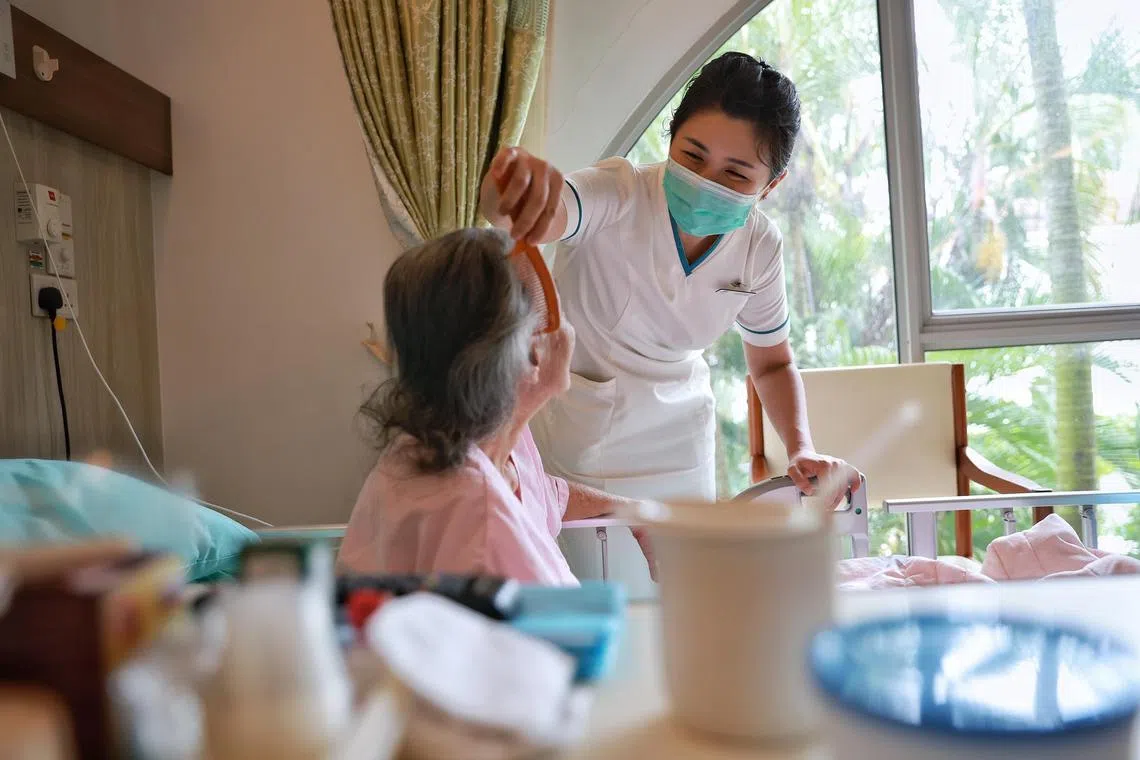‘It’s difficult not to get too close’: Hospice nurses describe emotional toll of caring for the dying
The relentless, almost daily experience of coming face to face with death is something many struggle with
Sign up now: Get ST's newsletters delivered to your inbox

Nurse Tan Wei Xian helping a patient brush her hair at Dover Park Hospice on April 5, 2023.
ST PHOTO: KEVIN LIM
Follow topic:
SINGAPORE - Every time a patient dies at Dover Park Hospice, the nurses there observe a moment of silence and line up along the corridor to pay their respects as the patient is wheeled out of the ward for the last time.
Called the Honour Walk, it is a gesture which Ms Tan Wei Xian has made countless times since she joined the hospice just four months ago.
Performing her duties as a nurse was no issue, as she had spent 17 years at Singapore General Hospital. But the relentless, almost daily experience of coming face to face with death was something she struggled with in the beginning.
Ms Tan, 39, said: “I had witnessed death before in hospitals, but never on a daily basis, so it was something I had to learn to get used to quickly.
“Dying is part and parcel of life; everyone dies. It’s my duty as a palliative nurse to make sure that they are comfortable and their dignities are maintained, even as they reach the end of their lives.”
She said that it’s natural for nurses to spend a lot of time with the patients and their families, to get to know them and what they value in life so that their wishes are respected during the last phase of their journey.
“It’s difficult not to get too close to them. I think the hardest part is when we have to witness the death of a patient we have formed a very close bond with. It can be quite difficult, and of course, an emotional experience.”
Senior staff nurse at Assisi Hospice Dawn Lim, 33, said her switch from paediatric care to palliative care in 2020 was not easy.
She recounted one patient at the hospice, an 18-year-old boy, whose death emotionally impacted the team greatly.
“He was a ray of sunshine among the elderly patients, constantly zooming around the ward on his motorised wheelchair and singing along with the radio.”
The team threw an 18th birthday party for him in the ward, with a cake designed after the Marvel superhero Iron Man, to fulfil his last wishes.
“We witnessed his deterioration over time, and eventually, he passed on in our ward. His passing was an emotional event for all of us who cared for him, not just for nursing staff, but the entire multi-disciplinary team involved in his care.
“I remember some of our colleagues commenting ‘Life isn’t fair, he’s far too young’. We see elderly patients who pass on almost on a daily basis, but a child? This was something that many of us took a while to come to terms with.”
Ms Lim and all her colleagues who cared for the young patient attended a counselling session together to share their feelings on his death and find ways to move forward.
Those who make the switch into end-of-life care may sometimes struggle with managing their psycho-emotional well-being, assistant director of nursing for Dover Park Hospice Joyce Goo said.
“Not all healthcare professionals, especially nurses, are prepared to face patients that pass on almost every day.”
Ms Goo said that when acute hospital nurses switch to a hospice setting, they are often assigned to a trained senior nurse who will mentor them and check on how they are coping.
Dover Park Hospice, which served more than 1,000 patients in 2022, also supports all its nurses through counselling sessions and even meetings to discuss their emotions.
Called The Brave Space, staff hold what they call “huddles” to share their emotions and any difficult experiences they have had to go through at the hospice.
HCA Hospice, which serves around 3,600 patients every year, encourages its nurses to turn to its managers for support, or approach the in-house psychologist. It also has arrangements with an external counsellor whom nurses can book a session with.
Nurse managers may also assign nurses at risk of burnout to a different role, like triage duties, within the organisation, so that they can take a break from field work.
Assisi Hospice organises bi-weekly staff welfare activities, like massage sessions and pottery, for staff to recharge and interact with other colleagues.
Despite the challenges of the job, both Ms Tan and Ms Lim gain fulfilment from being in this line of work.
Ms Tan said: “Being able to make a difference and allowing my patients to feel alive during their last days is very fulfilling, and the gratitude from their families reminds me how important my job is.”
Ms Lim said she used to get emotionally attached to patients who reminded her of her grandmother, who died two months after she joined Assisi Hospice. That was when she made a mental note to draw a line between her work and personal feelings, so that she could provide professional nursing care in the long run.
“I also take comfort in the belief that they are in a much better place, and that they are no longer in pain. This was how I also came to terms with my grandmother’s passing after much reflection – believing that she is free from illness and in a better place now,” she said.
“When you witness death on a daily basis, and see patients approaching death, you will wish that they are able to pass on peacefully and comfortably.
“Being able to help them pass on comfortably – I see it as an honour that not many people are able to have in their lifetime.”


